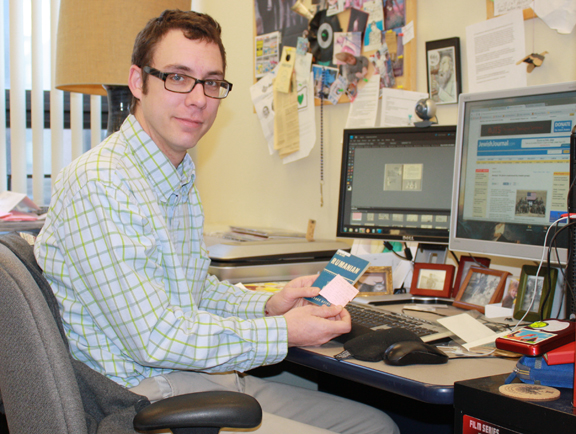
In 1963, a high school student left a little pink note in a Rumanian language handbook in Love Library; he wondered how often the book was used. Now we know. Nearly 50 years later, that little note surfaced, and libraries professor Richie Graham feels pretty good about it.
Graham, who does research on the government’s use of cartoons and comics, found the note in a 1943 paperback issued by the U.S. War Department titled “Rumanian: A guide to the spoken language.” The book was illustrated by Walt Kelly, who went on to fame as the writer of the comic “Pogo.” It was apparently issued for World War II-era soldiers.
The note is hand-printed in pencil on a 2-inch square pink paper. It reads:
“David Erbach used this June 12, 1963. Just for kicks, drop me a line at 2979 Dudley. I am curious just how often this vital info is perused.”
Graham said a 35-minute Internet search uncovered David Erbach’s name in an obituary for his father, Walter Erbach, a faculty member in Engineering Mechanics who retired in 1984 from UNL. The obituary said David lived in Bowling Green, Ky., and Graham was able to track him to Western Kentucky University.
Graham sent an email and surprised David Erbach. He does not remember writing the note, but said that in 1963, he was a high school student at Lincoln Northeast, and he often used Love Library to research debate topics, which that year was disarmament. He also thinks he might have looked at the book because he was studying French and interested in romance languages. Or his father might have had the book because of his father’s interest in Rumania, a place he visited a couple of times.
“It’s like putting a note into a bottle and chucking it into the ocean,” Erbach told Graham.
Notes and found items in library books have long fascinated Graham, who keeps a Flickr site of things he’s discovered.
“As we move away from print culture, these sort of human connections are going to be lost,” Graham said. “Twenty or 30 years from now, are people going to look for comments on web pages? We are losing the ability to make those serendipitous connections that make life interesting. Those notes in textbooks, discovered years later, help us find a commonality. It’s nice to know that the warmth of a human hand has touched the same thing as you. It’s an analog way to get together in a crazy cold digital world.”
Graham noted that scholars pore over margin notes and base whole careers on what they find. Books owned and used by Nebraska writers Willa Cather and Mari Sandoz, held in the university archives, have bookmarks and other personal items that help us now understand those authors’ lives, he said.
David Erbach is a professor of mathematics and computer science at Western Kentucky and science co-director of SKyTeach, a program to strengthen the teaching of STEM disciplines in high schools. He attended the University of Nebraska between 1965 and 1969. He earned his Ph.D. from Cambridge University in England.
The email query from Graham, and subsequent query from this writer, prompted Erbach to comment about how we “pass culture” from one generation to the next.
“How do we use the Internet to do better, instead of worse, about understanding how our most serious difficulties came to be as they are? A Google search of all the old books Google has digitized might help in theory. In practice, I know from conversations with colleagues and undergraduates, it just doesn’t. Keywords don’t replace serendipity.
“The question here is ‘How do we pass information - and ultimately culture - from one generation to another, in an Internet age?” he said. “ I have a feeling that Richard and I are probably both quite interested in the question, though, probably, I don’t actually know, we come from very different backgrounds. And it strikes me as a very serious issue.”
— Kim Hachiya, University Communications